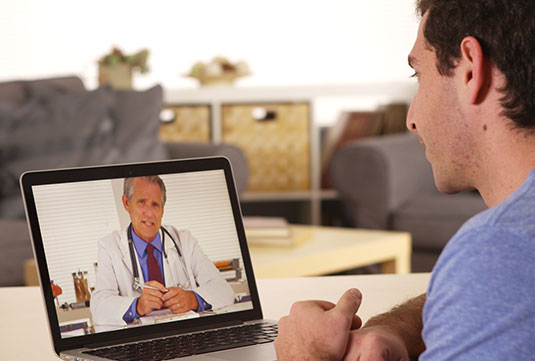
Telemedicine was initially designed as a way of helping to provide medical care to those in remote areas with very limited access to medical care and resources.
However, it has become more and more popular among the general population as a convenient, less time-consuming means to healthcare.
Thanks to modern technology, more and more people can now et instant medical assistance with just a few clicks on their computer or mobile devices.

How does Telemedicine work?
Telemedicine is regular, Western medicine practiced without a doctor and the patient has to be in the same room, building, or even town! How is this achieved? Online, of course. Nowadays, so many people have access to the internet, and more and more people are doing everything online.
From online grocery shopping to online dating and now, online doctor consultations. Telemedicine allows you to consult with a legitimate healthcare practitioner via face-to-face online meetings, where you can discuss health issues, get advice, and even be provided a prescription.
How does Telemedicine benefit patients?
Telemedicine has many benefits for patients. This is why more and more people are using it as a healthcare service. It is especially beneficial to those who don’t have easy access to healthcare professionals, for example, those without means of transport who need to consult with a doctor urgently.
It is also ideal for the elderly or those with disabilities. Setting up an appointment, getting to a physician, and waiting to see a doctor can be an extremely daunting and exhausting experience for these individuals in comparison to healthy people.

Emergency and chronic illness benefits
Telemedicine can also be vital if you have an emergency after hours when doctor’s rooms are closed. For example, you may have a baby with a high fever in the early hours of the morning, and not know what to do.
A licensed healthcare professional can be contacted online and you will be advised on whether or not you should seek emergency treatment or not.
Finally, Telemedicine is highly beneficial to patients with chronic illnesses, including mental health conditions, as these patients have to visit doctors and specialists regularly for check-ups.
Apart from the convenience of not having to physically get to appointments multiple times in short spaces of time, it will save you from missing work or other important commitments.

How does Telemedicine benefit doctors?
While Telemedicine has been designed for patients as a priority, doctors benefit from this system too. It gives them an opportunity to work remotely, from anywhere, including their homes, giving them more time with family.
It also means less money spent on staff such as receptionists and assistants, as well as the costs of renting out space in a clinic, hospital or sperate office.
Telemedicine and the spread of the virus
Since the outbreak of the worldwide pandemic, Telemedicine users have increased enormously. In fact, it is extremely important that Telemedicine exists today as the whole world is encouraged to practice social distancing.
Telemedicine means not going into doctor’s offices where you may be exposed to this potentially deadly virus.
This is especially important for individuals who are more vulnerable to severe complications from the virus, including hospitalization and even death-these individuals being the elderly, those with underlying illnesses, and those who suffer from respiratory illnesses.
Further benefits of telemedicine
Doctors waiting rooms are obviously filled with people who are unwell, so it’s no surprise that being around other sick people puts you at higher risk for infection, even despite the extreme measures taken in terms of masks, hand sanitizing, and seat spacing.
Keep in mind that doctors and their staff are also at risk every single day when they deal with patients during these uncertain times.
With Telemedicine, both patient and doctor are completely safe from contracting any illness while still effectively dealing with everyday health concerns.
